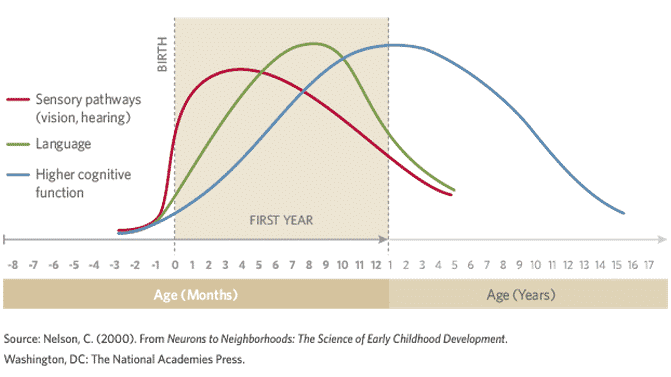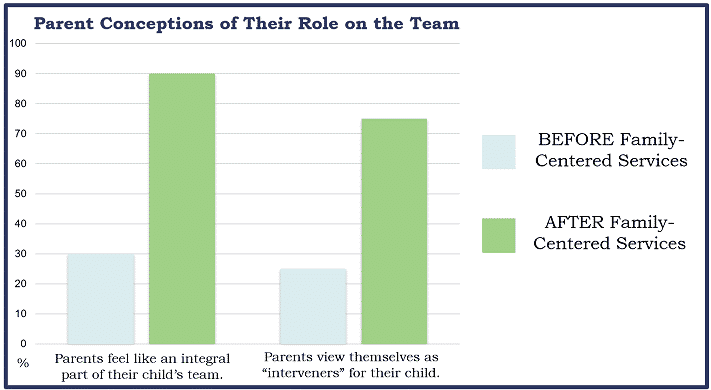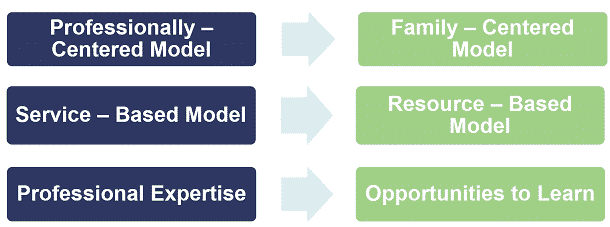Family-Centered Practice: Strategies to Support an Early Intervention, Team-Based Approach Through Parent Coaching
by Mary Lofreso, M.A., CCC-SLP
DePaul School for Hearing and Speech, Pittsburgh, Pennsylvania
OBJECTIVE
To provide early intervention professionals the tools to make their practices family-centered by empowering parents, through coaching, in order to optimize speech and language development.
Professionals will be able to:
- Understand how parents traditionally conceive their role in early intervention
- Identify strategies and supports that are helpful to families
- Demonstrate parent coaching using strategies during therapy sessions
INTRODUCTION
The first five years of a child’s life are the most critical years for brain development. Neural pathways are formed that are the foundation of development. This time has even been referred to as the “saving grace” for children facing adversity (Asby, 2018). As health professionals, how can we take this window of opportunity and optimize the development of neural pathways, fostering a successful future for children? We can optimize success by providing a team-based approach to those in need, through family-centered practices.
As stated in the Encyclopedia of Early Childhood Development, “Parental responsiveness and support play an important role in providing a strong foundation for children to develop optimally.” (Landry, 2014) We are capable of empowering parents through recognizing their strengths, providing resources and creating opportunities for them to learn. Including them as members of the intervention team is key to a child’s success.
The parent’s role during speech and language intervention has changed over time from being a passive observer of therapy, to becoming an essential part of the intervention (Roberts & Kaiser, 2011). After much research, we know that including parents in early intervention makes a difference in the outcome. In order to understand this, we need to understand a parent’s conception of their role in speech and language therapy and what they feel helps them become an essential part of their child’s early intervention team.
As speech-language pathologists, we must extend our role into more than just assessment and intervention, adding a teaching/coaching role.
PARTICIPANTS
All of the participants in this study were parents of children in the toddler program at DePaul School for Hearing and Speech. Each received individual Auditory-Verbal Therapy parent coaching sessions with their child and a speech-language pathologist every other week. In addition to their services in the toddler program, some families received services through the local children’s hospital and home-based early intervention from an ENT physician, audiologist, speech-language pathologist, and teacher of the deaf.
METHOD
The families participating completed a survey asking about the conception they have of their role on their child’s early intervention team. Based on their experiences with professionals during their child’s time in early intervention services, parents gave their input on what type of service-delivery they find best includes them as a stakeholder on their child’s team, including strategies and tools to use during therapy to form a parent-professional partnership.
DISCUSSION
Research indicates that children develop speech and language skills at a faster pace when the service delivery model is family-centered, especially during early intervention. The findings from this project suggest that the majority of parents prefer their child’s intervention sessions be coaching sessions in which the provider gives strategies and tools for the parent or caretaker to carry over into daily routines and different settings by modeling and providing opportunities to participate in the facilitation of activities in order to achieve treatment goals.
Parents should be given opportunities to learn and participate in intervention activities with their child. The importance of giving parents the opportunity to practice language-facilitation strategies under the observation and guidance of service providers is paramount.
HUMAN BRAIN DEVELOPMENT
THE FIRST 5 YEARS

RESULTS
Parents reported that before receiving family-centered early intervention services, they felt as though they were not an integral part of their child’s team and only saw themselves as passive observers.
Key Findings
- Parents prefer coaching sessions.
- Parents need education on how to advocate for their child/rights.
- Parents want interprofessional communication.
Takeaway Strategies
- Team goal writing/progress monitoring
- Weekly session summary
- Educational supports
- Home programs: goals, activities, etc.

LET'S MAKE A SHIFT!
Family-Centered Practice Model

REFERENCES
Asby, D. (2018). Why Early Intervention is Important: Neural Plasticity in Early Childhood. Center for Educational Improvement.
Davies, K. E., Marshall, J., Brown, L. J., & Goldbart, J. (2017). Co-working: Parents’ conception of roles in supporting their children’s speech and language development. Child Language Teaching and Therapy, 33 (2), 171-185.
DeVeney, S. L., & Hagaman, J. L. (2016). Comparison of Parent-Implemented and Clinician-Directed Intervention for Toddlers Indentified as Late Talkers: A literature Review. EBP Briefs, 10 (6), 171-185.
Dunst, C. J. (1985). Rethinking Early Intervention. Analysis and Intervention in Developmental Disabilities, 5, 165-201.
Dunst, C. J. (2000). Revisiting “Rethinking Early Intervention”. Topics in Early Childhood Special Education, 20 (2), 95-104.
Landry, S. H. (2014). The role of parents in early childhood learning*. Encyclopedia on Early Childhood Development.
Roberts, M. Y., & Kaiser, A. P. (2011). The Effectiveness of Parent-Implemented Language Interventions: A Meta-Analysis. American Journal of Speech-Language Pathology, 20 (3), 180-199.

